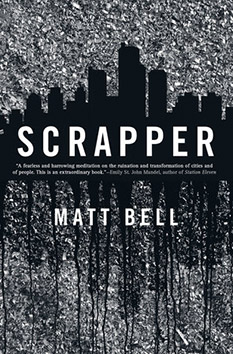
This is the next of my Covid-19 dystopian novels. Only, this time, there is no raging outbreak, no alien invasion or foreign threat. This time, what renders the novel dystopian is that it “imagines” America—or at least the heart of Detroit—as a post-industrial wasteland. I put the word “imagines” in quotation marks because, at this point in time, Matt Bell could write reportage instead of fiction and end up with the same book. Scrapper was published in 2015, one year before Donald Trump was elected POTUS and proceeded to dismantle the last vestiges of the New Deal social safety net, sacrificing working class America on an altar built by neoliberal ideologues, and guaranteeing that, despite isolationist posturing, American manufacturing and the supply chains that deliver its inputs end up anywhere but in America. The result is an eviscerated manufacturing base that turns places like Detroit into Hobbesian nightmares where life is nasty, brutish and short.
Against this backdrop we have Kelly, a scrapper, so-called because he forages through The Zone, Detroit’s industrial ruins, searching for scrap metal. The title is a pun because, in addition to foraging for scrap metal, Kelly conditions himself at the local gym. He’s confrontational. He gets into street fights. He’s preparing for a fight against someone who outmatches him. In other words, he’s a scrapper.
Kelly is not the ideal Everyman. There are hints of a past flecked with violence. He once lived in the south with a woman and a boy, and he may have hurt them both. The precise circumstances remain murky. Now, he tries to live with more self-control, or at least with enough self-control that he does less harm than he used to do. He has met a woman and they have entered into something that looks like a relationship. However, the woman has a deteriorating medical condition that makes her increasingly dependent. Despite his protestations, his girlfriend thinks he won’t want to care for her when her condition makes her too burdensome. Given his past, she may be right.
One day, while scavenging in a house, Kelly discovers a basement lair where a sadist has left a boy chained to a bed. He releases the boy and, in a meeting orchestrated by the media, collects a reward from the boy’s parents. Notwithstanding media efforts to portray them as such, the boy’s parents aren’t exactly June and Ward Cleaver. They are separated and have come together only to offer their smiling faces for the cameras. They aren’t even the boy’s biological parents. That in itself shouldn’t matter, but the preponderance of evidence suggests that, like the television appearance, the adoption only ever served to promote a public image. Theirs is a Joan Collins adoption, the sort of move a publicist would recommend. The problematic family dynamic is compounded by the fact that their older son uses the separation as cover for his own sadistic games with the boy.

After the rescue and after the reward, the boy seeks out the scrapper. There are moments when they form an odd family unit: the scrapper, the girlfriend with the limp, and the boy running ahead of them. However, an ongoing relationship with the boy raises a suspicion that it is the scrapper who abducted the boy in the first place and that the boy’s continuing relationship is a manifestation of Stockholm Syndrome. It is impossible to say for certain what is going on here.
The scrapper is determined to avenge the wrongs that have been perpetrated against the boy. He creates a room very much like the room where he first discovered the boy, and intends to use it to torture the boy’s kidnapper. He scours The Zone for the kidnapper, but without success. He settles for the boy’s older brother. Although he knows the brother did not kidnap the boy and did not lock him in a torture chamber, he knows the brother did abuse the boy. Punishing the brother as if he were the kidnapper is good enough for the scrapper.
The novel’s climax—and the occasion for some of its best writing—is a boxing match between the scrapper and the contender. It’s a foregone conclusion (is there any other kind?) that the scrapper will go down, but he faces the contender the same way any tragic character faces his destiny. It’s a perverse kind of substitutionary atonement that borrows from the death row inmate’s logic: it’s unjust that a man must die for a crime he didn’t commit, but the inmate reconciles himself to the unjust punishment by acknowledging that he committed other comparable crimes for which he was never caught. In the same way, the older brother didn’t commit the kidnapping, but he still deserves to be punished for it because he does just that sort of thing.
This is what justice looks like in a post-Christian post-industrial postmodern post-truth America. Precise lines of accountability don’t really matter as long as there is a rough equation between culpability and punishment. In a different context, we might call this karma. So, for example, Eliot Ness got Al Capone on charges of tax evasion. The district attorney never had the satisfaction of proving Capone’s more serious crimes, but the criminal met a fitting end. We’ll get Donald Trump on something, too. It doesn’t matter what. Let’s just get the motherfucker.
The vast majority of contemporary novels lead us through a struggle to a resolution that brings about a sense of redemption for the main character. Scrapper self-consciously addresses this convention. Early in the novel, Kelly attends a church basement support group. Bell is never explicit about the nature of the group, but it probably supports people in grief. Is this related to the southern woman and her son? We can’t be sure. Bell writes this about the group:
The living came to meeting after meeting until they knew how to structure the story. These were the basic redemption tales, stories of education through suffering: All they had to do was learn to love someone through their hurt.
Is this the sort of tale we have in Scrapper? Or does the fact that it self-consciously considers the question call into doubt the very idea of redemption? Maybe, like Bonhoeffer’s grace, there is the cheap redemption of a conventional story line, and the costly redemption of a character who throws himself wholly into the act of atonement and, in the effort, consumes even his reward.